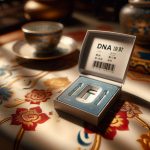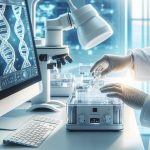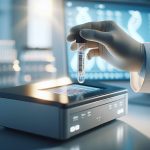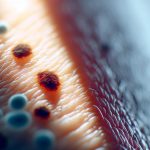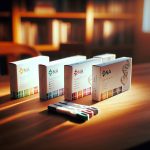108Labs is at the forefront of a groundbreaking field, crafting molecules and antibodies found in human milk. Shayne Guiliano, the brains behind the operation, shares how this innovative approach could be a game-changer for nourishing both young and old across the globe, with an eye on improving health outcomes everywhere.
The origin and development of the company: From conception to current status
My journey into the intersection of organic chemistry and software development has spanned two decades, leading me down a path where technology meets biology in innovative ways. It was about eight years back when the fascination with cellular agriculture took hold—a field ripe with potential yet barely tapped into for biotechnological applications. The initial spark ignited in 2013, focusing on replicating meat and leather at the cellular level, but soon veered towards a groundbreaking exploration: could we create milk without cows?
In September of that year, a lab space became my new arena of experimentation in Research Triangle Park, NC. Discussions quickly evolved from sourcing cells for meat and leather to an audacious idea—milk production directly from cells. The concept wasn’t entirely new; scientists have been working with mammary cells for ages. However, scaling this up for food production was uncharted territory.
This led to the birth of Cellufacturing, a vision that reimagines cells as tiny factories capable of producing essential nutrients outside their original biological context. This venture aimed not just at replicating cow’s milk but improving upon it by removing unnecessary processes like pasteurization since our cell-produced milk lacks a microbiome, thus retaining more nutritional value right from production to consumption.
Fast forward to 2016; ambitions expanded towards 3D cell culture techniques culminating in a significant proof-of-concept by late 2019. An exciting breakthrough came early next year with the synthesis of secretory antibodies akin to those found in mother’s milk—an advancement poised to revolutionize how we think about infant nutrition and beyond.
Our proprietary approach holds promise against traditional methods not only in quality but cost-effectiveness too, marking it as potentially the first therapy-grade human secretory IgA available globally. Paired with human-like milk molecules created through this novel process, we’re inching closer toward mimicking the immunological properties of human milk.
The fusion of these technologies opens up possibilities far beyond infant health—potentially benefiting adults as well by offering key nutrients usually obtained exclusively through natural mother’s milk including proteins, lipids, complex sugars among others recognized for their positive impact on health.
Looking back perhaps with ample funding initially more research could’ve been invested upfront before diving deep into our ambitious experimentations—But here we are today standing at the cusp of bio-innovation that can change how we view nutritionfrom infancy through adulthood.
Why should parents pick your product among numerous alternatives?
Making strides in the realm of infant nutrition presents a unique challenge. Cow’s milk, often used as a substitute when mother’s milk is scarce, offers a solid nutritional base critical for young ones’ growth. However, it falls short in delivering key immunological benefits inherent to human milk, lacking specific components such as adequate levels of tryptophan and essential antibodies that fight off infections.
The journey to mimic the rich nutritional blueprint of human milk has led to significant innovations within the industry. The primary hurdle with cow’s milk is its initial unsuitability for newborns due to potential toxicity and nutritional imbalances; hence it undergoes extensive processing to meet stringent safety standards. This rigorous refinement process aims at aligning cow’s milk more closely with human needs, focusing on reducing its high protein content and boosting other vital nutrients.
On the flip side, formula manufacturers are on a constant quest to prove their products can safely replace mother’s milk. Their objective isn’t just about mimicking but transcending the basic nutrient profile by incorporating elements that bolster infants’ immune systems akin to natural maternal immunity.
While donor milk serves as an alternative supplementing infant diets where mother’s milk isn’t available, it too faces limitations. Despite being beneficial, once pasteurized, a necessary step to ensure safety, its antimicrobial potency diminishes. Moreover, this sector suffers from lax oversight leading to uncertainties regarding the quality and composition of available donor samples.
Advancements in science now promise solutions that not only bridge but surpass these gaps. Pioneering efforts have yielded formulations that emulate both the nutritional essence and immune-protective attributes of maternal milk more faithfully than ever before. Through meticulous research, we’ve unlocked possibilities of replicating even complex elements like wild-type antibodies found in mothers’ natural supply—an advancement poised at significantly elevating infant care standards globally.
In summing up this narrative arc within infant nutrition evolution—a field where merely duplicating nature was once considered ambitious—we now stand at the cusp of redefining possibilities through innovation and diligent scientific exploration.
How do commercial and personalized human milk differ from a consumer’s viewpoint?
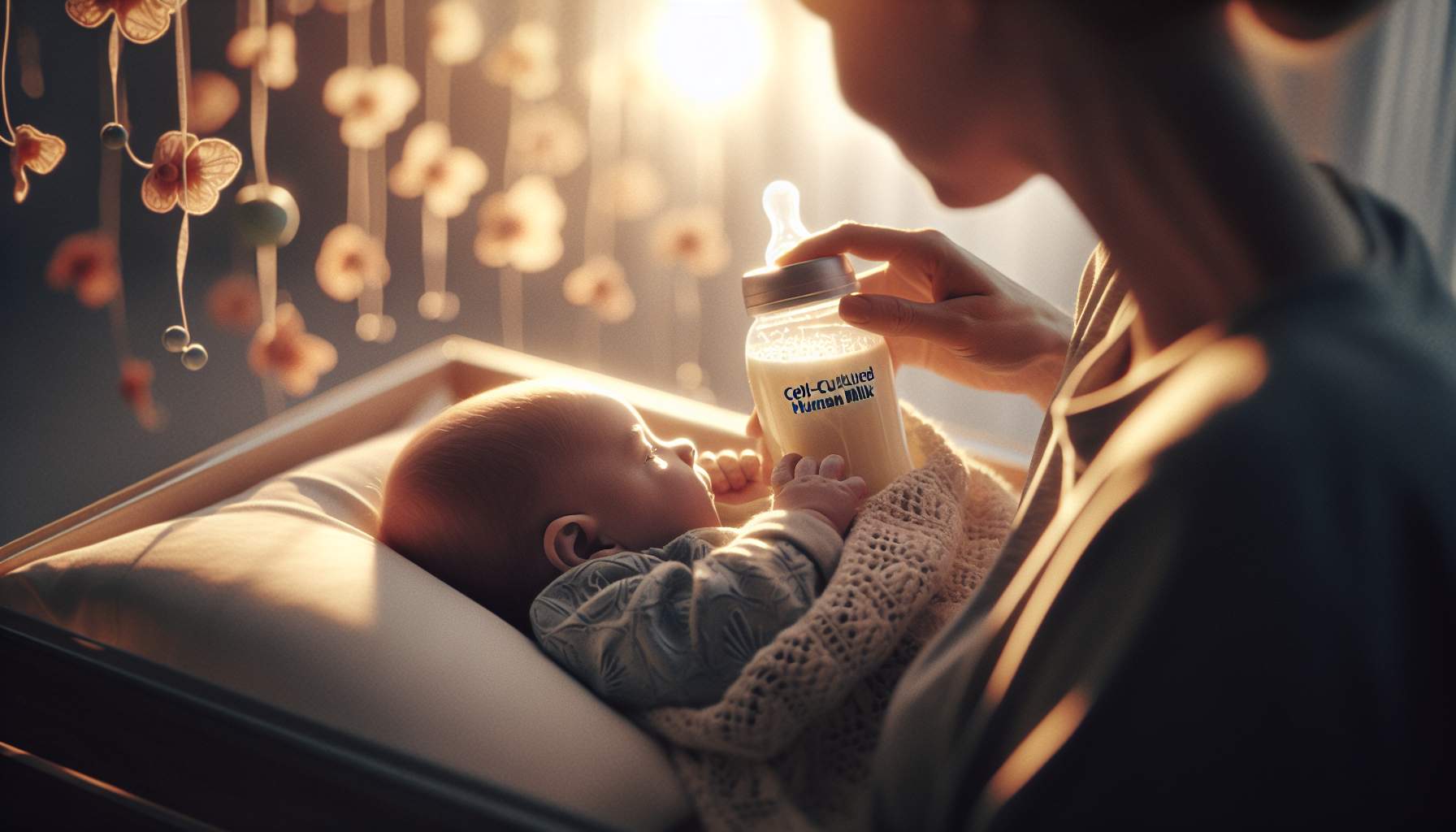
In the realm of modern milk biotechnology, customization is indeed a fascinating feature. Yet, when we dive into nutritional essentials, personalizing doesn’t hit the top spot. The presence and balance of key nutritional elements are what truly matter. It’s interesting to note that variations in protein sources or their ratios have minimal effects on nutrition.
However, the game changes entirely when we talk about immunity—specifically for newborns adjusting to life outside the womb. Here, tailoring antibodies in milk to reflect a mother’s immune system significantly bolsters an infant’s defense mechanisms against pathogens during those crucial early months. This personalized approach shines for preterm babies who face distinct challenges compared to their full-term counterparts.
The importance of immunological memory can’t be overstated, just ask anyone undergoing bone marrow transplants facing a wiped slate of immune memory. Without it, even simple germs turn into formidable foes.
Thankfully, nature has equipped milk with incredible anti-microbial powers that pair beautifully with antibodies. By harnessing these properties and enhancing them through science, we’re on the cusp of introducing infant formulas that rival mother’s milk itself—a milestone in nurturing neonatal health.
Beyond biology lies an emotional dimension; parents’ desire to contribute intimately to their offspring’s well-being transcends mere nutrition. Imagine using one’s own cells to create nourishing milk—an idea once relegated to science fiction is now unfolding in labs today.
This evolution in mammary cell agriculture offers more than just sustenance; it fosters a profound connection between parents and child—irrespective of nursing practices or parental gender dynamics.
As technology marches forward, reminding us that while not all advances tilt the nutritional scales significantly, they weave together biology and bond—a testament to human ingenuity nurturing future generations.
How could you influence public health?
Our greatest influence lies in closing the gap between a mother’s natural milk and that of cow or donor sources, especially for premature babies who are born between the 28th to 38th week of pregnancy. These little ones are at high risk for serious health issues such as sepsis and Necrotizing Enterocolitis. Enhancing their diet with oral immunoglobulins and fresh human milk components could drastically improve their immune defenses, boost energy levels, and mimic the unique benefits found in a mother’s own milk.
We can enhance donor milk by adding these same fresh, active ingredients which meet the care standards for preterm infants. Introducing neutralizing antibodies is another step forward in shielding these newborns during an incredibly delicate phase of their lives. It wasn’t until the late 20th century that neonatal science emerged, highlighting the necessity for exclusively human milk diets for babies born before 32 weeks. Where a mother cannot provide her own milk, enriched donor sources become essential.
Currently, no sanctioned products exist specifically to prevent common yet severe conditions like late-onset sepsis or necrotizing enterocolitis among early-term babies. These youngsters also face a significant threat from developmental disorders affecting their brains and hearts — making rapid calorie intake and infection prevention critical goals.
The World Health Organization notes that access to immunoglobulins within the first six months can save thousands from infections annually. However, millions more remain vulnerable globally due to insufficient healthcare support in less developed countries. Early-stage infants are particularly prone to diseases due to weaker immune systems.
In parts of the world where mortality rates can reach up to 90% among early-term infants, often due to inadequate hospital environments, introducing oral immunoglobulins along with fully bioactive human milk elements holds promise for substantial improvements.
In the United States alone, we invest around $5 billion yearly into interventions for preterm births resulting in adverse outcomes; still, about a thousand babies die each year under these circumstances while thousands more face potential lifelong disabilities. Without access to maternal milk from birth up until six months old every baby stands a chance of falling victim to severe health challenges.
Therefore our main goal remains clear: bridge this crucial immunological divide between maternal and alternative milk sources—doing so is pivotal in protecting our future generations’ health.
Can Colostrupedics™ replace cow milk?
Imagine a future where the milk we drink doesn’t come from cows but is made in labs, perfectly mimicking human breast milk. This isn’t just a wild idea; it’s becoming more of a reality as we explore the potential of lab-grown human milk. The concept might make some uncomfortable, thinking about « farms » of human milk production which raises ethical eyebrows. Yet, when we talk about creating this vital nutrient outside of the body, using cells to produce it in an ethical manner, the conversation changes.
Until now, real human milk has only been sourced directly from mothers. This limitation has stigmatized its use beyond infant nutrition despite its unmatched benefits for humans of all ages. Human breast milk is tailored for us – packed with essential amino acids and active biological compounds without the risk of allergies present in cow’s milk.
The reasons to pivot away from dairy are compelling on their own – ranging from reducing animal suffering and environmental impacts to addressing health issues more effectively. As awareness grows alongside proof of its advantages, society’s acceptance might follow suit.
Looking ahead, envisioning equal access to both cow and lab-produced human milk may seem far off—possibly 20 years into the future—but it’s not out of reach. With advances in science and shifting perspectives on what’s best nutritionally and ethically, this change seems not just possible but inevitable. The day will come when everyone could benefit from this innovation—from infants to adults fighting serious illnesses like cancer through enhanced nutrition that boosts passive immunity.
In short, as weird or futuristic as it may sound today, making the switch could have profound implications for our health, environment, and how we think about providing nourishment across all stages of life.
Handling bias related to human milk being sold
The discussion surrounding breast milk has escalated to a point where it feels more like a political battleground than a health conversation. To sidestep this contentious atmosphere, I find it more productive to focus on the core issue at hand: the potential for saving lives through improved nutritional options. Today, there exists a bias among consumers against human milk, yet medical professionals prioritize outcomes over origins, recommending solutions that promise the best health benefits.
The concern isn’t necessarily about what we’re calling it—whether milk or otherwise—but about maximizing the wellbeing of those we can help. The introduction of biosynthetic formulas designed to replicate human milk offers promising advantages over traditional bovine-based products. This innovation could lead to significant improvements in infant nutrition and survival rates.
However, communication is key. We must be careful with our words, choosing terminology that respects and honors mothers while promoting scientific advancement. Instead of simply referring to these innovations as milk, « milk molecules » offers a term that both respects the sensitivity of the topic and emphasizes the technological progress behind it.
Ultimately, if these new formulas prove capable of enhancing health outcomes better than their predecessors, their adoption seems inevitable regardless of temporary skepticism or linguistic preferences. The priority remains clear: advancing nutritional science in ways that benefit our youngest and most vulnerable.




